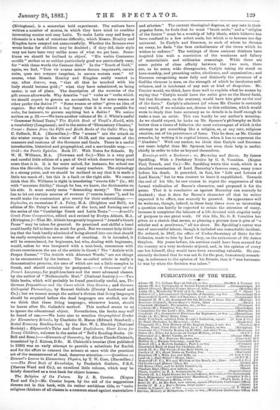The Religion of the Future. By 3, B. Crozier. (Kegan
Paul and Co.)—Mr. Crozier hopes, by the aid of the suggestions thrown out in this book, with its rather ambitions title, to "unite religious thinkers of all classes in a common stand against materialism and atheism." The current theological dogmas, at any rate in their popular form, he feels that be must "brush aside," and a "religion of the future" must be a worship of lofty ideals, which hitherto has been confined to a few select souls, but which is to become one day universal. In Carlyle and Emerson, to each of whom he devotes an essay, he finds "the best embodiments of the views which he wishes to enforce." The writings of these eminent thinkers have inspired him with a conviction of the weakness and fallacy of materialistic and utilitarian reasonings. While there are some points of close affinity between the two men, there are, as he notes, wide divergencies, Carlyle taking his stand on hero-worship, and preaching order, obedience, and organisation ; and Emerson recognising more fully and distinctly the presence of a Godlike element in man, on the strength of which ho inculcates self- reliance, and is intolerant of any sort or kind of despotism. Mr. Crozier would, we think, have done well to explain what he means by saying that "Carlyle would have the artist give us the literal facts, but that Emerson, on the contrary, would have him give us the soul of the facts." Carlyle's admirers (of whom Mr. Crozier is certainly one) would, if we mistake not, demur to this criticism, which would seem to imply that bare accuracy as to details is in itself enough to make a man an artist. This can hardly be our author's meaning. As we should expect, be looks on Mr. Spencer's philosophy as little better than a tissue of fallacies, the most extravagant of which is the attempt to get something like a religion, or, at any rate, religions emotion, out of his persistence of force. This he does, as Mr. Crozier remarks, by writing it in capital letters, when it has to represent the "Absolute." With our author, we think that Carlyle and Emerson are more helpful than Mr. Spencer, but even their help is useful, chiefly in order to take us beyond themselves.






































 Previous page
Previous page